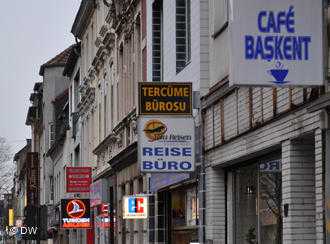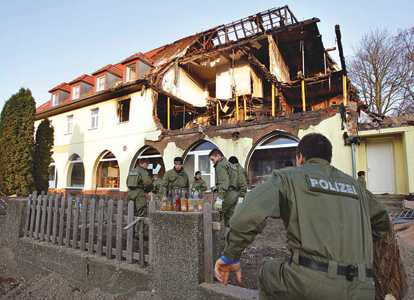Neo-Nazis behind ‘Doner Killings’ as German security services under fire
David Crossland
Nov 16, 2011
BERLIN // German security authorities face accusations they grossly underestimated the threat of far-right violence after the chance discovery that a neo-Nazi group murdered nine immigrants in one of the country’s most mysterious and longest-running killing sprees.
The group of at least three people called itself the National Socialist Underground (NSU), and had prepared a gruesome DVD to send to news organisations and Islamic cultural centres claiming it murdered eight Turks and one Greek man between 2000 and 2006 in different cities.
The victims all worked in shops and stalls. Because two ran doner kebab stalls, the murders became known as the “Doner Killings”. The NSU also said it shot dead a German policewoman in 2007 and planted a nail bomb in Cologne in 2004 that injured 22 people, most of them Turks. Police say the group had also committed 14 bank robberies since 1999.
Until recently, the police had insisted the “Doner Killings” were committed by the Turkish mafia or motivated by nationalist splinter groups in Turkey.
But the link to neo-Nazis was revealed this month when police found the murder weapon, a Czech-made Ceska 7.75 millimetre Browning, in an apartment in the eastern town of Zwickau rented by neo-Nazis – two men and a woman.
The men, Uwe Böhnhardt, 34, and Uwe Mundlos, 38, were found dead in a camper van in the eastern town of Eisenach on November 4 after apparently committing suicide following a botched bank robbery.
A few hours later, the house in Zwickau was apparently set ablaze by their alleged accomplice, Beate Zschäpe, who later turned herself in to police.
The case has embarrassed the security authorities, which have for years treated far-right crimes as isolated incidents committed by thugs and have devoted far more resources to combating the threat of terrorism.
Experts are comparing the scale of the violence committed by the NSU to the campaign of assassinations and kidnappings waged by the left-wing Baader-Meinhof group that terrorised Germany in the 1970s.
One major difference is that the Baader-Meinhof members followed up their attacks with messages of responsibility. The NSU killed in silence. While its members had been on police files as right-wing extremists since the 1990s, the existence of the group was apparently unknown to authorities until two weeks ago, and police appeared to have had no idea that they were behind the killings.
In the burnt-out Zwickau apartment police found four DVDs already packaged and ready to send, containing a chilling 15-minute film using the Pink Panther cartoon figure that in one scene stands next to a placard reading: “Germany Tour – 9th Turk shot dead,”
It also showed photos of victims who had been shot in the face. The DVDs were aimed at publicising the group’s actions for the first time, police said.
The trio’s ability to get away with the murders for so long has triggered calls for a reform of Germany’s regionally fragmented security agencies.
Representatives of Muslim and Jewish groups accused the police of having been blind to the emergence of neo-Nazis bent on violence against minorities.
The chairman of the Central Council of Muslims in Germany, Aiman Mazyek, said on Monday that German authorities had chronically underestimated right-wing extremism for 20 years.
“Evidently right-wing terrorism was able to expand unhindered because the authorities were too focused on religiously motivated attackers,” Mr Mazyek told Neue Osnabrücker Zeitung, a regional newspaper.
Eastern Germany in particular has been dogged by right-wing extremism since the fall of the Berlin Wall. There was an upsurge in violence against immigrants and asylum seekers in the early 1990s as people vented their anger over high unemployment that followed the rapid economic collapse in the former communist region. Analysts have also blamed the rise of neo-Nazism in the east on a lack of education about the Nazi crimes in schools during the communist regime. Attacks on Jewish and immigrant property and racist assaults on ethnic minorities are common there.
Experts on right-wing extremism said the neo-Nazis could have been stopped before they killed.
“No one can say it wasn’t possible to detect the potential of the Thuringia groups in the 1990s,” Bernd Wagner, an analyst of the far-right culture, said. “They should have been taken seriously and tracked down.”
The group went underground in 1998. Ms Zschäpe has been remanded. A suspected helper was arrested on Sunday in the northern town of Kleinau.
The co-leader of the Greens Party, Cem Özdemir, told Welt am Sonntag: “How could the suspects spend years murdering people due to right-wing extremist motives without the police and domestic intelligence service having even the slightest inkling of it?”
The case has led to renewed calls to ban the National Democratic Party, described as the flagship of the far-right. The party is openly xenophobic and anti-Semitic and extols a vision of a Fourth Reich containing only Germans.
Analysts say the far-right has festered in the east due to a lack of political support for anti-racism campaigns and a failure by police to clamp down hard enough on far-right crimes.
“There is a whole landscape of militant groups from which such terrorist groups and networks can emerge,” said Mr Wagner.
via Full: Neo-Nazis behind ‘Doner Killings’ as German security services under fire – The National.



